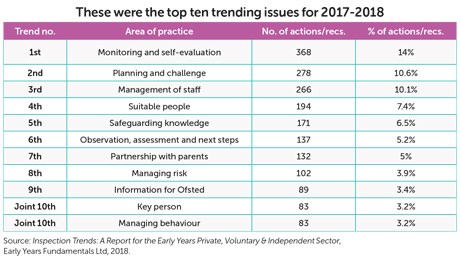Unpicking Ofsted Reports, Part 12: Top Ofsted issues
Pennie Akehurst
Monday, February 18, 2019
To round off our series on common themes in Ofsted inspections, Pennie Akehurst presents the top ten problem areas from 2017-2018

In the last academic year, I reviewed 2,947 early years private, voluntary and independent Ofsted inspection reports, and out of this sample:
- 81 per cent of preschools, playgroups and nurseries achieved a Good or better inspection outcome.
- Of those that had been Good or better, less than 0.5 per cent of Outstanding providers fell below Good in a subsequent inspection.
- The number of newly registered providers who did not achieve a Good or better inspection outcome was low, but we need to keep an eye on this situation because those numbers are on the increase.
- There were no dramatic changes from term to term between the percentages of Outstanding, Good, Requires Improvement and Inadequate inspection outcomes.
However, the data also highlighted that:
- One in five early years settings did not achieve a Good or better inspection outcome.
- And 11 per cent of the Good providers were unable to sustain a Good or better inspection outcome.

The areas that appeared with significant frequency in inspection reports:
Monitoring and evaluation appeared most frequently in requires improvement and inadequate inspection reports across all three terms and focused largely on the effectiveness of teaching and learning and the accuracy of self-evaluation.
The effectiveness of planning and appropriate levels of challenge was the second-highest-trending issue, followed by the management of staff, which focused predominately on the rigour of performance management activities and lack of development opportunities.
How can we use this information to guide what we do this year?
We know that a new inspection framework is looming and with that is likely to come a greater focus on teaching and learning, but we also know safeguarding will remain an important part of the inspection process. It therefore makes sense for us to get to know both the old and the new Early Years Inspection Handbook (now out) to better understand what inspectors will be looking for. If we’re not looking at the same things as our inspector, there are likely to be gaps in our view of quality that could leave us vulnerable.
As leaders, we are expected to have an accurate view of the quality of our provision. Time needs to be invested in ascertaining the effectiveness of our current monitoring and evaluation systems. The areas that recur with alarming frequency in inspection reports are:
a. the quality of teaching and learning
b. the progress that children are making
c. and the setting’s ability to meet the welfare requirements.
We need to ensure that we have robust systems in place that enable us to understand what is working well and where there is room for improvement. This information should provide us with a clear justification for our priorities for improvement.
Performance management
Those with a responsibility for managing staff need to gain a secure understanding of how to implement effective performance management systems. This is an area of weakness across the sector, which could stem from the fact that many qualifications haven’t gone far enough to prepare us to manage staff: we don’t know what we don’t know.
And lastly, we need to spend time unpicking our full inspection report, not just the section that highlights ‘What the setting needs to do to improve further’ (i.e. the actions and recommendations made by the inspector). Using the content of the full report will enable us to identify practice that was seen as a strength that can be added to our self-evaluation documents and to identify any important points that did not become actions/recommendations to ensure that they are not overlooked. This is will reduce the likelihood of issues being raised in subsequent inspections. We also need to use our full inspection report to understand how actions/recommendations came about, which will help to ensure that we take robust and exhaustive actions to address any issues raised.
Working intensively on these aspects will help reduce our vulnerabilities for future Ofsted inspections.




